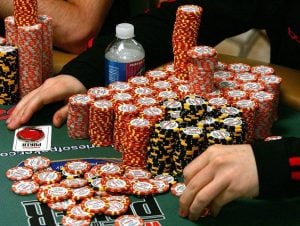Effective Decision-Making And Sweating The Small Stuff
Next time you’re making a hard decision, back off a little and consider that it may not matter.
 Pay close attention to the expected value of your decisions.
Pay close attention to the expected value of your decisions.
I read the other day about someone who was learning poker and discovered that one of the most important lessons is that hard decisions tend not to matter. If it’s a hard decision, the expected value either way is pretty close. But the easy decisions matter, and an unforced error there matters a lot.
Poker, as everyone who lived through the Great Texas Hold ‘Em Boom of 2003–2006 remembers, is mostly a game of probabilities. The main skill is quickly evaluating your cards, the community cards, and figuring out the probabilities of certain hands. Then you use that knowledge to inform your bets, read your opponents, and try to make an educated case as to what cards they’re holding. It’s lots of quick math. Sometimes you obviously have a bad hand (and should fold) or a great hand (and should bet). And sometimes, it’s a really close decision.

Generative AI In Legal Work — What’s Fact And What’s Fiction?

Human nature is to agonize over those close decisions. It’s tempting to think there’s a right answer and you can figure it out. Confirmation bias further muddies the waters, as it’s also human nature to feel that if the choice turned out well, you made the right choice, and if the decision turned out badly, you made the wrong one.
But causality doesn’t work like that. Events that occur afterward seem inevitable in retrospect, even when it’s a coin flip. And it doesn’t matter what you pick in a coin flip: either one you pick is going to give you a 50% chance of winning. A slight change on either side doesn’t make much of a difference either: if you’re stuck between a decision that gives you a 52% chance of winning or 48%, neither one is going to make much of a difference.
In real life, of course, you never really know what the probabilities are, you’re just making an educated guess, and it’s basically impossible after the fact to figure out what the odds were. Nate Silver’s 2016 election prediction, giving Clinton a 71.4% chance of winning, was probably correct, but who can say. Even though that was based off voluminous amounts of data and statistical analysis, you can’t verify the probability of a one-off event. And decisions in law, of course, are much vaguer still. Trying to put a probability on what way a judge will rule or any other decision a single person will make is complete guesswork. It gets only worse when you get more granular, like trying to decide what argument to lead with. You’ll never know the real probabilities, so if you’re torn between two options, it’s probably close enough to a coin flip to not matter. It also doesn’t matter that humans find probabilities unintuitive and tend to interpret anything above 70% as certain.
On the other hand, easy decisions are free points which add up quickly. If a decision is easy, and you’re confident it’s a good one, it probably has a high probability of success (assuming your judgment is right in the first place). And those decisions matter: if choice A gives you a 90% chance of helping your argument and choice B a 10% chance, then, unlike a coin flip, the 90% will make things better, even if just marginally. Individually, it’s not much, but they add up, both because there tends to be a lot of easy decisions and because you can nearly always evaluate them much more quickly than the tough calls. In the time you spend agonizing over a 50/50 decision, you could be identifying more easy choices. It feels like you’re doing more by figuring out the hard one, but it’s comparatively just spinning wheels.
Sponsored

The Business Case For AI At Your Law Firm


Generative AI In Legal Work — What’s Fact And What’s Fiction?


How Transactional Lawyers Can Better Serve (And Maintain) Their Clients

How Transactional Lawyers Can Better Serve (And Maintain) Their Clients
So next time you’re making a hard decision, back off a little and consider that it may not matter. Instead, sweat the small stuff a little more and see what easy decisions you can identify and get right.
 Matthew W. Schmidt has represented and counseled clients at all stages of litigation and in numerous matters including insider trading, fiduciary duty, antitrust law, and civil RICO. He is a partner at the trial and investigations law firm Balestriere Fariello in New York, where he and his colleagues represent domestic and international clients in litigation, arbitration, appeals, and investigations. You can reach him by email at matthew.w.schmidt@balestrierefariello.com.
Matthew W. Schmidt has represented and counseled clients at all stages of litigation and in numerous matters including insider trading, fiduciary duty, antitrust law, and civil RICO. He is a partner at the trial and investigations law firm Balestriere Fariello in New York, where he and his colleagues represent domestic and international clients in litigation, arbitration, appeals, and investigations. You can reach him by email at matthew.w.schmidt@balestrierefariello.com.
Sponsored

Legal AI: 3 Steps Law Firms Should Take Now








